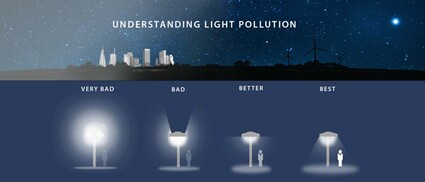Saving the Dark film was a hit in Sisters, encore showing on tap
Last updated 1/22/2020 at Noon
Finding a parking space in the vicinity of the Sisters Movie House last Wednesday evening, January 15, was a more difficult task than normal for a weeknight. A likely reason for this was, besides the usual number of mid-week moviegoers, others from the Central Oregon region converged in Sisters to view a special movie about how to preserve our dark skies. And it was free of charge.
The film is a documentary entitled “Saving the Dark” with a purpose to raise awareness of ever-increasing levels of light pollution worldwide that are degrading humanity’s ability to see the stars. The excessive light also creates health problems for humans and wildlife. Currently, about 80 percent of Americans live under light-polluted skies, and the situation is worsening by more than six percent per year in large cities. Even here in Sisters people can see the growing light domes of neighboring communities.
The movie explained corrective measures that can be taken to reduce, or even reverse, the spread of light pollution and create a safer night environment. New research stresses that more light is not necessarily safer. What is most important for safe lighting is deliberately lighting the desired area while limiting glare.
Some things that can increase outdoor safety and simultaneously reduce light pollution include using lamps that produce warm-colored light (less than 3,000 kelvins).
The more red-orange colored light is not as harsh on the eyes and doesn’t inhibit the production of melatonin (a hormone that helps people and animals sleep) as much as white-blue light.
Making sure lights are fully shielded behind opaque barriers that direct light downward and prevent glare from the light bulb and that are installed as low to the ground as possible, minimize light being sent into the sky and into areas that don’t need to be lit.
Using motion sensors to signal when someone is present, and keeping the lights off as much as possible increases safety because when the light is on, that indicates someone is present.
Any time lights can safely be turned off, wild animals benefit.
The film was created and directed by Sriram Murali in collaboration with the International Dark-Sky Association (IDA). Murali had little exposure to observational astronomy growing up because his night sky was aglow with bright lights. Yet it was this fact that inspired him to make the film.
The Sisters showing of Saving the Dark was planned and implemented by Sisters High School student Ramsey Schar, co-president of the SHS Astronomy Club, in partnership with the Oregon IDA, Sisters Astronomy Club (SAC), Sisters Movie House, the Sisters Science Club, and local artist Paul Allen Bennett. Schar embraced the opportunity to take on this project as part of her Astronomy Independent Study class. She is passionate about astronomy and preserving dark skies. Many others from the SHS Astronomy Club and SAC also contributed their time and talents to help make the event a smashing success.
As a prologue to the movie, artist, author and songwriter Paul Allen Bennett entertained the audience with a couple of musical numbers, while playing his ukulele, that referred to the joys of being able to observe the starry realm above and how to help keep it dark. After the proceedings, he made his book “Night Skies” available for purchase.
Following the hour-long movie, the audience was invited to stay for a question-and-answer session with a panel of special guests who represented different perspectives in the community. The panel consisted of Brent Crosswhite, Sisters’ school resource officer of the Deschutes County Sheriff’s Department; Patrick Davenport, community development director of the City of Sisters; Peyton Griffin, wildlife biologist and member of Sisters Science Club; and Mary Ann Kruse of Oregon IDA.
People asked questions regarding what to do about overly bright and “glary” lights on or near private homes. Although Sisters has a Dark Sky Standard and Deschutes County has its own lighting ordinance, compliance is usually complaint driven. Talking with neighbors and friends about proper outdoor lighting can help people understand the value of our dark skies and the ability to see the stars here. Lack of awareness of the City and County regulations often drive noncompliance.
Davenport fielded some tough questions about why Sisters hasn’t been using more fully shielded outdoor lights. Apparently the excessively bright streetlights on Cascade Avenue was the result of a decision made by the Oregon Department of Transportation that overrode the desires of the City.
Griffin iterated that even minor amounts of light can put stress on many wild organisms in the local ecosystems. The message here is turn off outdoor lights whenever possible. Using motion sensors that dim or turn lights off at different times might help. The use of warmer colored lights was encouraged.
The showing of Saving the Dark at Sisters Movie House last Wednesday drew an overflow crowd. With a seating capacity of 116, others seeking entrance had to be turned away. This is a testament to those who worked hard to get the word out via TV, radio and the printed page weeks in advance. It is also an indication that more people care about preserving our precious dark skies here in Central Oregon.
For those who were unable to attend the event last Wednesday, or were turned away at the door because the theater was full, another showing of the film will take place on Wednesday, February 5 at Sisters High School beginning at 6:30 p.m. Admission is free. The film can also be viewed for free on YouTube. The IDA website, Dark Sky, gives more information about dark-sky friendly lighting.

















Reader Comments(0)